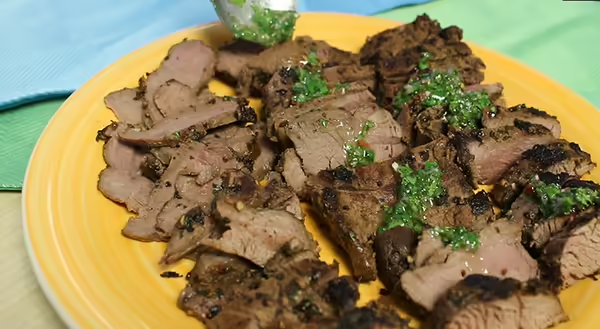
Partnerships are a big part of Illinois Extension programs. This one started with a conversation about deer hunting and turned into recipe videos and a blog series. So many ‘thank you’s to Sara Wade, MS, RD, LDN, with Kirby Medical Center for sharing her experiences.
Check out Part 1 of this series on Know How, Know More for an introduction to venison. And see Part 3 of this series on Healthy Eats and Repeat for three easy venison recipes!
Nutrition
Three ounces of cooked venison contains around 96 calories, 3g fat, and 18g protein. Venison contains vitamins and minerals, including vitamins K and B-12 and iron, zinc, and choline. Venison contains no carbohydrates or fiber.
- Store: Treat raw venison like other raw meat. Keep in a sealed container or wrapped to prevent meat juices from contaminating other foods. Refrigerate at 41°F or colder. For whole cuts of raw meat, use within three days. For ground raw venison, use within one to two days. Frozen venison should be kept at 0°F and wrapped tightly to limit freezer burn.
- Thaw: If frozen, thaw venison safely in one of four safe ways. In the refrigerator is best, but other options can be safe too.
- Preparation: Marinating can help reduce gamey flavors. Any marinade with an acidic ingredient, such as lemon juice or vinegar, will help tenderize the meat. Marinating longer than 24 hours can result in mushy meat.
- Cook: As Wade noted in Part 1, any recipe that uses beef can be replaced with venison, such as chili, tacos, pasta sauce with meat, pot roast, and more. She suggests, “… when browning the ground venison, I treat just as I would 90/10 ground beef. I typically don’t have any grease or fat to drain.”
- Temperatures: University of Minnesota Extension recommends whole cuts like steaks or roasts be cooked to a minimum internal temperature of 145°F, and ground venison be cooked to a minimum temperature of 160°F.
- Slicing: Because venison is lean, cut against the grain of the meat. “Grain” refers to the direction the meat muscle fibers run. Cutting in the opposite direction of the grain can cut the muscle fibers shorter and make it easier to chew. Thus giving the perception of more tender meat.
- Leftovers: For any leftover cooked meat or recipes cooked with venison, refrigerate within 2 hours of cooking and use leftovers within 3-4 days or freeze for longer storage. Reheat leftovers to 165°F.
References:
- FoodData Central. Agricultural Research Service. USDA.
- Deer Hunting, Illinois Department of Natural Resources
- Freezing and Canning Venison, Ohio State University Extension, 2019
- Cooking venison for flavor and safety, University of Minnesota Extension, 2018
Healthy Eats and Repeat
How much difference is there between canned and frozen foods? How should you cook venison? When is the best time to buy avocados? Get answers to these questions as well as other tips, tutorials and recipes for common kitchen foods and items with University of Illinois Extension Nutrition & Wellness Educator Caitlin Mellendorf’s blog Healthy Eats and Repeat. Build your best life. Trust Extension to help.
Caitlin Mellendorf is an Illinois Extension Nutrition and Wellness Educator serving DeWitt, Macon and Piatt Counties in Central Illinois. She is a Registered Dietitian and her work focuses on helping community members gain the knowledge, skills and tools to live healthier, more nutritious lifestyles. This includes providing programs and answering questions about heart health, diabetes, food safety, food preservation, grocery shopping and cooking. You can reach Caitlin by email at chuth2@illinois.edu or call 217.877.6042. Check out her nutrition blog Healthy Eats and Repeats for seasonal recipes and of an exploration of common kitchen foods.